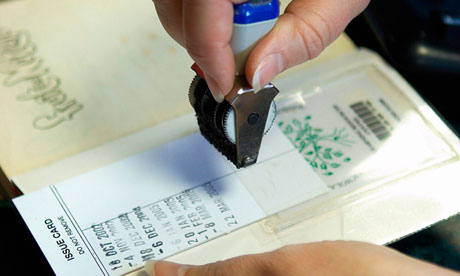A government-commissioned report has allayed fears that digital lending could damage the book industry

The Sieghart review says that e-lending should follow print conventions. Photograph: Geraint Lewis/Alamy
Library users should be able to borrow ebooks from home, according to a government-commissioned report into e-lending. This is great news for anyone who agrees that lending ebooks is a crucial part of a modern library service, especially as e-readers get more affordable.
The Sieghart review was set up to look into the issue after publishers and the Society of Authors raised fears that e-lending could damage the book industry. Any worries seem to me to be based on two shaky hypotheses: that people who borrow never buy (in fact, library users buy more books than the average person) and that people who read ebooks don't buy print books (actually you are more likely to buy a print book if you own an e-reader).
There is no logic in allowing libraries to lend physical books and not electronic books, so long as proper controls are in place. The Sieghart review sensibly suggests that digital lending should echo physical lending – forcing ebooks to "deteriorate" after a certain amount of loans, for instance. It also recommends the long-overdue extension of public lending right (PLR) to e-loans.
Curiously, the report made no mention of the world's biggest bookseller, Amazon, even though the retailer has its own subscription-based digital lending library and recently acquired a patent for selling secondhand ebooks. Worryingly, Amazon also allows customers to return, and get full refunds for, ebooks up to seven days after purchase. Even if you've read them. The organisers of a petition campaigning for an end to this easily abused policy claim it is "like going into a restaurant, buying a meal, then asking for a refund after you've already eaten it". In this context, any lingering doubts about library e-lending look increasingly immaterial.
The Sieghart review was set up to look into the issue after publishers and the Society of Authors raised fears that e-lending could damage the book industry. Any worries seem to me to be based on two shaky hypotheses: that people who borrow never buy (in fact, library users buy more books than the average person) and that people who read ebooks don't buy print books (actually you are more likely to buy a print book if you own an e-reader).
There is no logic in allowing libraries to lend physical books and not electronic books, so long as proper controls are in place. The Sieghart review sensibly suggests that digital lending should echo physical lending – forcing ebooks to "deteriorate" after a certain amount of loans, for instance. It also recommends the long-overdue extension of public lending right (PLR) to e-loans.
Curiously, the report made no mention of the world's biggest bookseller, Amazon, even though the retailer has its own subscription-based digital lending library and recently acquired a patent for selling secondhand ebooks. Worryingly, Amazon also allows customers to return, and get full refunds for, ebooks up to seven days after purchase. Even if you've read them. The organisers of a petition campaigning for an end to this easily abused policy claim it is "like going into a restaurant, buying a meal, then asking for a refund after you've already eaten it". In this context, any lingering doubts about library e-lending look increasingly immaterial.